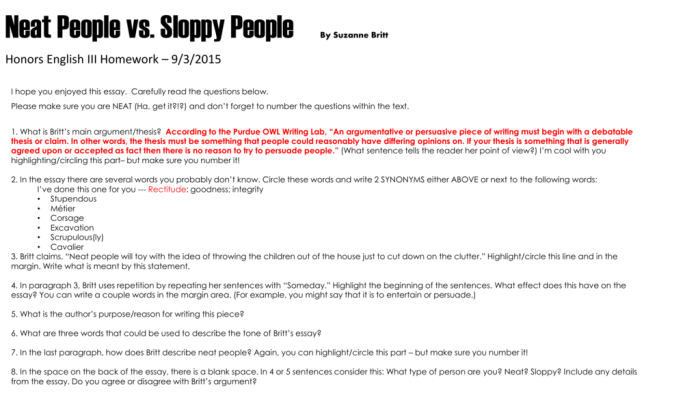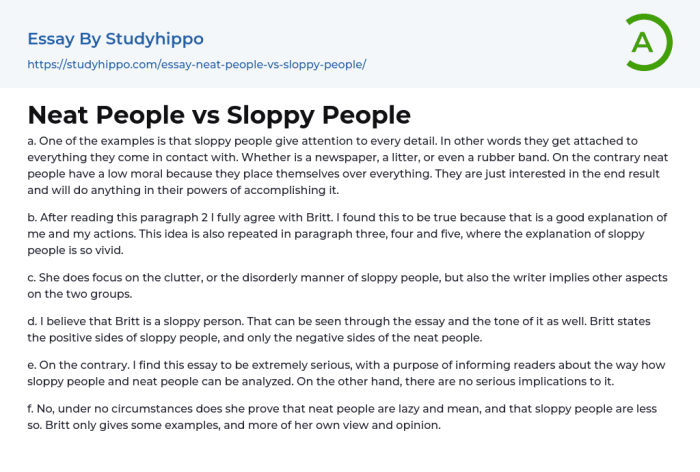Neat people vs sloppy people suzanne britt – Neat People vs. Sloppy People by Suzanne Britt delves into the fascinating realm of human behavior, exploring the contrasting characteristics of individuals who prioritize orderliness and those who embrace a more relaxed approach to organization. This comprehensive analysis unravels the psychological motivations, societal perceptions, and workplace implications associated with neatness and sloppiness.
Through a rigorous examination of research and case studies, Britt sheds light on the complexities of these traits, providing valuable insights into the impact they have on our personal lives, professional endeavors, and social interactions.
Defining Neatness and Sloppiness: Neat People Vs Sloppy People Suzanne Britt

Neatness and sloppiness are two distinct personality traits that describe an individual’s approach to organization and order. Neat people tend to be tidy, organized, and meticulous, while sloppy individuals are often characterized by their disarray and lack of attention to detail.
Characteristics of Neat People
- Highly organized and structured
- Attention to detail and order
- Clean and tidy spaces
- Efficient and productive
- Respectful of boundaries
Traits Associated with Sloppy Individuals
- Disorganized and chaotic
- Lack of attention to detail
- Untidy and cluttered spaces
- Inefficient and unproductive
- Disregard for boundaries
Comparison of Neatness and Sloppiness
- Order vs. Chaos:Neat people value order and structure, while sloppy individuals embrace chaos and disarray.
- Attention to Detail:Neat people pay close attention to details, while sloppy individuals often overlook them.
- Efficiency:Neatness promotes efficiency and productivity, while sloppiness can hinder these attributes.
- Social Perception:Neatness is generally viewed favorably in society, while sloppiness is often associated with negative stereotypes.
Psychological Factors Influencing Neatness and Sloppiness

Psychological Motivations Behind Neatness
- Order and Control:Neat people often derive a sense of order and control from their organized surroundings.
- Anxiety and Stress Reduction:A tidy environment can reduce anxiety and stress levels for some individuals.
- Self-Discipline:Neatness requires self-discipline and the ability to maintain order.
- Esteem and Identity:Some individuals find that a neat environment boosts their self-esteem and sense of identity.
Potential Causes of Sloppiness
- Executive Functioning Deficits:Sloppiness can be associated with difficulties in executive functioning, such as attention, planning, and organization.
- Trauma and Stress:Traumatic experiences or chronic stress can disrupt organizational habits.
- Personality Traits:Certain personality traits, such as impulsivity or disinhibition, can contribute to sloppiness.
- Environmental Factors:Cluttered or disorganized environments can reinforce sloppy habits.
Relationship between Personality Traits and Organizational Habits
- Conscientiousness:Individuals high in conscientiousness tend to be neat and organized.
- Neuroticism:Individuals high in neuroticism may experience anxiety and stress, which can lead to sloppiness.
- Extroversion:Extroverts may be more likely to engage in social activities that can lead to clutter and disorganization.
- Agreeableness:Individuals high in agreeableness may prioritize harmony over order.
General Inquiries
What are the key differences between neat people and sloppy people?
Neat people tend to be organized, detail-oriented, and have a strong sense of order, while sloppy people may be more relaxed, impulsive, and less concerned with maintaining a tidy environment.
How do societal perceptions influence neatness and sloppiness?
In many cultures, neatness is associated with positive qualities such as competence, reliability, and self-discipline, while sloppiness may be viewed as a sign of laziness, carelessness, or disorganization.
Can neatness and sloppiness impact workplace performance?
In professional settings, neatness can contribute to a positive work environment, enhance productivity, and foster a sense of professionalism, while excessive sloppiness may hinder efficiency and create a negative impression.
